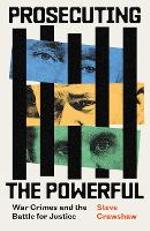Could we ever see Vladimir Putin in the dock for his crimes? What about a Western ally like Benjamin Netanyahu? Putting a country’s leader on trial once seemed unthinkable. But as journalist and human rights advocate Steve Crawshaw describes in Prosecuting the Powerful – a blend of vivid reportage and gripping history – a series of remarkable changes in recent years means that, despite many challenges, both scenarios are now a possibility. Drawing on his on-the-ground reporting from the front lines of justice in Ukraine and Israel, as well as earlier encounters with Serbian leader Slobodan Milo evic and other war criminals, Crawshaw tells the story of the long struggle for accountability. Beginning with the origins of the Geneva Conventions in the 19th century, the book travels via Raphael Lemkin, who coined the term “genocide” and pressed for its punishment, and the Syrian police photographer who helped put a torturer behind bars, up to the fierce arguments today over who exactly the International Criminal Court in The Hague should hold accountable for war crimes. Survivors are determined to achieve change. As Crawshaw argues, Western double standards cannot be allowed to tip the scales of justice.

Prosecuting the powerful: war crimes and the battle for justice
ISBN: 9780349128948
Format: Paperback
Publisher: Abacus Trade (ADS)
Origin: GB
Release Date: February, 2025


